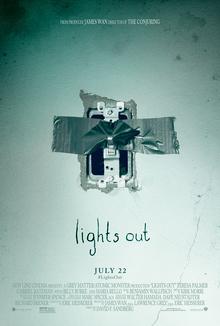I’m not quite sure how the monster in Lights Out should be classified. Perhaps a tulpa? A tulpa is a materialized being brought about by the power of thought, and at the end this seems to fit. But I’m getting ahead of myself. Rebecca and Martin are half-siblings. Their mother Sophie has abandonment issues—I knew this was getting into personal territory here, but I kept watching. Rebecca’s father had left when she was young and Martin’s father is killed in the film’s opening scene. But there’s a monster who’s responsible for all of this. Rebecca, it seems, fears attachment. Her boyfriend Bret, however, is faithful and devoted. All of them are threatened by the entity Diana, who can’t stand light. She can only be seen in the dark. She is the one who killed Martins’s father (and possibly Rebecca’s).

This intriguing premise is tied in with the idea of mental illness. Sophie, the mother, spent some of her early years in a mental hospital being treated for depression. It was there that she met and befriended Diana. Diana died, but not before insinuating herself into Sophie’s mind. This is why a tulpa suggests itself. A woman who fears abandonment conjures an entity who ends up developing its own agenda. Diana doesn’t want anyone to discover who or what she is. Such knowledge would offer a way of treating Sophie’s mental illness that might prevent Diana from existing in her mind. This is pretty sophisticated stuff. Not only that, but the movie plays on the very natural human fear of the dark. It makes you want to turn on all the lights.
I won’t spoil the ending here, but I will say it’s disturbing. I also think that it’s important to note how mental illness here is implicated as a kind of strength. Sophie felt abandoned and created a means of feeling accepted. If, however, Diana was really a separate entity inhabiting Sophie’s mind then we have here a form of possession. I don’t know of anyone who’s parsed movie monsters to so fine a degree but it seems to me a project worth undertaking. I’m not suggesting science should be used to appreciate horror films—there is a science of studying monsters, called teratology, but its use in the mainstream has come to mean something different—yet we can use scientific methods to treat our various fears. We do tend to find light from looking at and understanding what exactly our monsters are.
